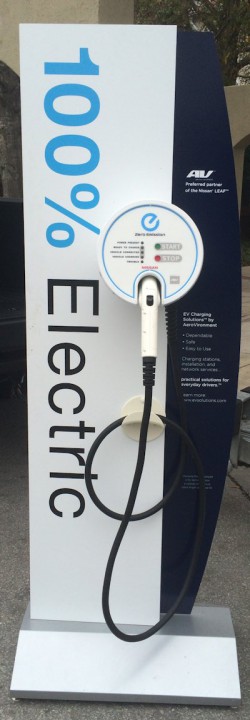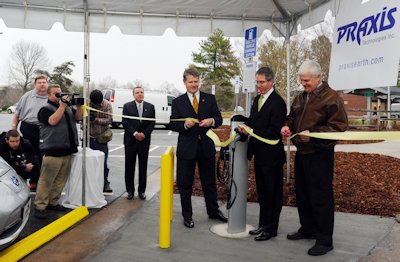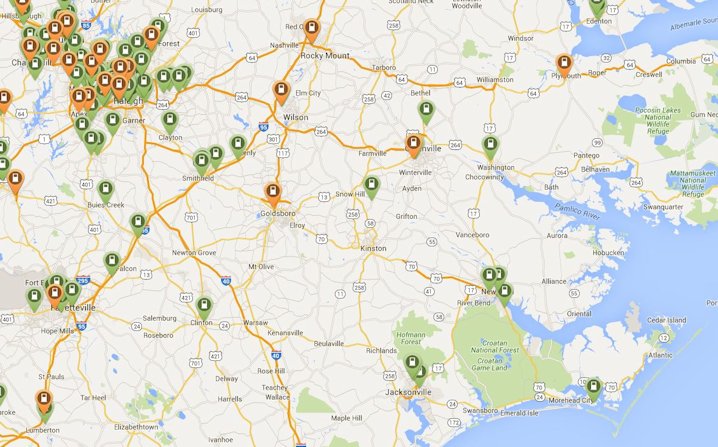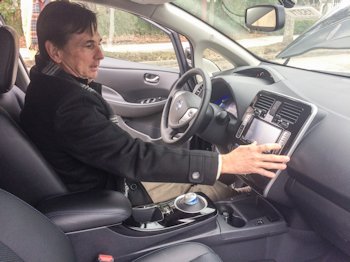
NEW BERN – U.S. 70 between Raleigh and the coast has a couple of long stretches with limited opportunities for motorists to fill up the tank but not so limited as to cause much worry. For folks who drive electric vehicles, however, there are far fewer places along the route to plug in and recharge.
The distances between charging stations for plug-in electric vehicles in the eastern part of the state are enough to cause what some call “range anxiety” – fears that the vehicle’s charge is insufficient to reach the driver’s destination. Because nobody likes getting stranded, range anxiety is considered a big barrier to wide-scale adoption of zero-emission, all-electric vehicles.
Supporter Spotlight
Despite this, sales of all-electric cars are growing in the state, especially in urban areas and among young, affluent buyers – the kinds of people merchants, hoteliers and tourism officials seek to lure to vacation destinations on the N.C. coast.
Judy Hills, executive director at the East Carolina Council of Governments in New Bern, says she’d like to see counties and municipalities in Eastern North Carolina become more competitive with other parts of the state in offering services for drivers of electric vehicles.
“If we want to attract the touring public who drives these cars, it’s something to think about,” Hills told a group Feb. 5 at the council’s offices in downtown New Bern.
The meeting was the first in a series of 11 planned sessions on electric cars. A handful of town and county planning and economic-development officials attended. The council sent invitations to many more, including tourism, military and transportation officials and chambers of commerce across the region.
The East Carolina Council is one of a number of regional groups in North Carolina working to create a plan for electric cars. It’s a collaboration with the N.C. Plug-in Electric Vehicle Taskforce, which has been working since 2011 to establish the state as a leader in electric transportation. The taskforce includes various industry, utility, nonprofit and other entities led by consulting firm Advanced Energy Corp. and the N.C. Commerce Department, providing research and support to local groups.
Supporter Spotlight
Hills said the state’s vehicle traffic is predicted to increase by 25 percent by 2030. A shift toward zero-emission electric vehicles can have significant health, environmental and economic benefits, she said, adding that Eastern North Carolina could suffer economic consequences if the region fails to provide services for such vehicles.
The council has funding from the federal Economic Development Administration to create a plan to accommodate electrics along the U.S. 70 corridor in this region. Having a plan in place could help position the region for grant opportunities to help pay for new charging stations along the route.
Hills cited research from the Electric Power Research Institute that there will be more than 700,000 electric vehicles on N.C. roads by 2030, including 37,000 in the eastern part of the state.
More than 3,300 electric cars were registered in North Carolina in 2014, the most recent figures available. Fewer than 50 were registered in Carteret, Craven, Jones, Lenoir and Wayne counties as of January 2015, according to information presented at the stakeholder meeting.
An Economic Boost

Michael Gunhus, owner and innkeeper at The Aerie Bed and Breakfast Guest House and Conference Center in downtown New Bern, installed a charging station for electric vehicles at the inn about a year ago. The idea was to provide an additional service for his guests but the amenity, which shows up in the navigation systems of electric vehicles, has also helped draw new visitors to the inn.
“It’s proven very successful for us,” Gunhus said.
Charging is free for guests of the inn but others can also take advantage of the service without staying the night. Visitors to the historic downtown area sometimes choose to get out and walk to the nearby shops and restaurants while their electric cars’ batteries recharge back at the inn. The inn charges a small fee for non-guests.
Gunhus doesn’t have a big investment to recoup. Select Registry, an innkeepers’ association of which Gunhus is a member, covered the installation cost, which totaled about $1,400. It was part of promotional deal the association had with Tesla Motors, a maker of high-end electric vehicles.
“They put it out to us and we said ‘sure.’ We were one of the first to sign on,” Gunhus said. “It’s very important that owners of Teslas know where they can go to charge.”
Tesla uses a unique connector that isn’t compatible with other makes. The B&B also has a second charging unit manufactured by ClipperCreek that can accommodate other electric cars.
“We can charge any vehicle and we knew we could increase our traffic by having this option. We are very pleased with it,” Gunhus said.

Vehicle Options
Car manufacturers are heavily invested in electric vehicle technology. There are about 30 different models on the market.
Nissan representatives were on hand at the meeting and offered test drives of their company’s flagship all-electric, the LEAF.
The Nissan LEAF is one of the more popular of the breeds, with sales that outpace about a dozen standard internal combustion engine-equipped cars, especially in certain markets including Atlanta, Ga., where tax incentives for buyers are better than in North Carolina. Nissan says it’s the best-selling electric vehicle in automotive history with global sales of more than 190,000 and more than 80,000 on U.S. roads. The 2016 model is powered by a 30-kilowatt-hour battery and has a range of 107 miles, according to its Environmental Protection Agency rating.
The LEAF can accommodate three types of chargers, which vary in terms of recharge speed.
An alternating-current, or AC, level 1 charger works on a standard 120-volt circuit and adds about five miles of range per hour of charging. An AC level 2 charger works on a 240-volt circuit such as the type used for home clothes dryers. This type charger adds about 20-40 miles of ranger per hour of charging. A direct-current, fast charging system requires a 480-volt AC circuit and provides up to 50 miles of range in about 10 minutes.
Tesla’s pricier Model S offers a mileage range of 270 miles, according to the EPA rating.
The Tesla Supercharger is touted as the world’s fastest charging station, providing a 170-mile charge in about 30 minutes.
Plenty of other options are available to car buyers. See the EPA’s website below for comparison information on all-electric vehicles.
Road Readiness

Making the U.S. 70 corridor more accommodating for electric vehicles could include working with hotel chains and state agencies, such as museums, aquariums and history centers, to install charging stations, Hills said.
North Carolina ranks 14th in the number of public charging sites. There are more than 600 charging stations across the state, mostly concentrated in the Triangle, the Charlotte area and in Asheville. These areas are also have the highest levels of electric car ownership in the state.
Public charging stations can also be found on the N.C. coast at the Boathouse at Front Street Village in Beaufort; the Hampton Inn and Edenton Harbor in Edenton; the Courtyard Marriot in Jacksonville; the Villages at Brunswick Forest in Leland; the Inn on Pamlico Sound in Buxton; and various other locations in Wilmington and along the Outer Banks, particularly north of Nags Head.
The availability of charging stations is key to the public’s adoption of electric vehicles, said Marcy Bauer, market manager for the Carolinas and Southern Virginia for NRG EVgo, a clean energy resources and technology firm with headquarters in Houston, Texas.
The company has partnered with Nissan, BMW and a few other electric vehicle manufacturers, said EVgo spokesman Jeremy Desel in a telephone interview. The company provides purchasers of certain electric cars free charging on its nationwide network of charging stations.
“Nissan was our first imbedded deal like that and it’s now blossomed into more than just Nissan,” Desel said.
The company’s chargers will work with a variety of autos, which use various charging standards, including the two different rapid-charging, direct-current types. Japanese and Korean manufacturers have one type while the latest European and American vehicles use another standard. Tesla uses yet another standard that is compatible with a special adapter.
Desel compared NRG’s chargers to pumps that offer both gas and diesel fuel.
“Our chargers are able to charge every electric vehicle on the road today,” Desel said. “We have the largest DC fast-charging network in the country.”
Pulling the Plug
Some say N.C. lawmakers have worked to pull the plug on electric vehicle sales. A state law that took effect in 2013 resulted in the removal of charging stations from N.C. Department of Transportation rest areas in Johnston and Alamance counties. The charging stations were installed in 2012 as part of a grant-funded pilot program and were free to use. The law directed the department to charge a fee for use but that directive conflicted with a federal law that said states may only collect money at rest areas along U.S. highways when it comes from vending machines.
North Carolina began in 2014 collecting an additional $100 fee from electric car owners. The extra fee was supposed to help offset the anticipated loss of revenue from the state’s gas tax, which goes to fund highway construction.







